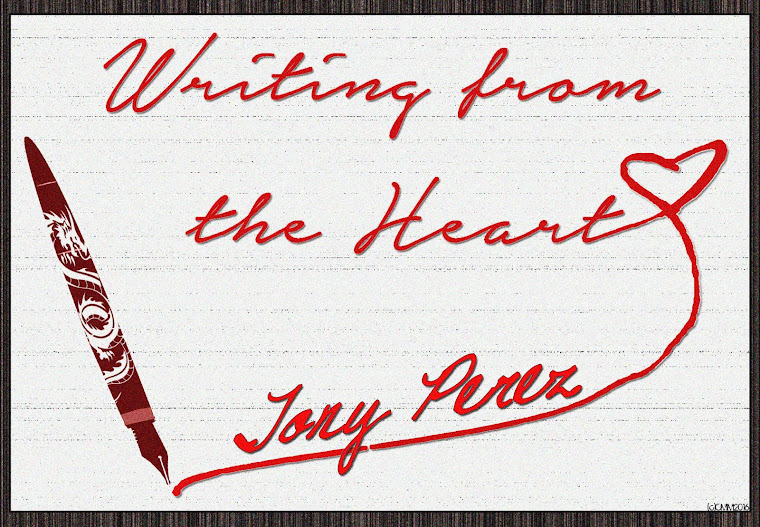Tony Perez's Workshop in Creative Writing, Creative Drawing, and Creative Drama
|
|
Writing from The Heart

Design and execution by Meeko Marasigan
Writing from The Heart
"Writing from The Heart" is a workshop on creative writing, creative drawing, and creative drama.
There are three available versions of this workshop: one for beginners on the secondary, tertiary, and graduate levels, and another for practitioners.
A third version of this workshop is designed as an outreach program to disadvantaged and underserved audiences such as the disabled, the poor and the marginalized, victims of human trafficking, battered women and abused children, drug rehabilitation center residents, child combatants, children in conflict with the law, prisoners, and gang leaders. This third version incorporates creativity and problem awareness, conflict resolution, crisis intervention, trauma therapy, and peacemaking.
CURRENT ENTRIES:
Wednesday, June 29, 2016
It is fear of poverty, not death, discrimination, or loss of love, that every writer and painter fears most. The archetype of the starving artist has long been ingrained in our sensibilities. That is why many contemporary writers and painters go out of their way to take on profitable, full time jobs to pay their bills, buy their food, build their houses, and prepare themselves for retirement.
You can tell that a writer has transcended a crisis by reading his/her recent work, and it is usually excellent work. Learn, therefore, to allow your anger, grief, frustration, and despair to fuel your creativity.
Personal crises, like wars, can either bring out the best or the worst in you.
Note that WWI and WWII gave birth to timeless cultural forms, such as jazz, Hollywood, modern housing, and the exploration of plastic.
Note also that CURRENT wars are giving birth to nothing but paranoia, religious dissent, discrimination, and indignity in travel. (Electronic technology doesn't count; it would have developed anyway with or without wars.)
Make your crises bring out the best in you.
Personal crises, like wars, can either bring out the best or the worst in you.
Note that WWI and WWII gave birth to timeless cultural forms, such as jazz, Hollywood, modern housing, and the exploration of plastic.
Note also that CURRENT wars are giving birth to nothing but paranoia, religious dissent, discrimination, and indignity in travel. (Electronic technology doesn't count; it would have developed anyway with or without wars.)
Make your crises bring out the best in you.
Friday, June 24, 2016
Never underestimate your sense of smell, including psychic smell, or clairaroma. It is probably the only sense that is hardly impaired in human beings and in animals, because it alerts us not only to the fragrance of Nature but to all kinds of danger as well.
Push your sense of smell over the metaphysical edge. Do not stop at using it to smell perfume, flowers, coffee, cinnamon and vanilla in pastries, freshly-cut grass, and the like.
How does a circle smell like? And a square?
How does the color red smell like? And the color blue?
How does happiness smell like? And loneliness, or even despair?
Push your sense of smell over the metaphysical edge. Do not stop at using it to smell perfume, flowers, coffee, cinnamon and vanilla in pastries, freshly-cut grass, and the like.
How does a circle smell like? And a square?
How does the color red smell like? And the color blue?
How does happiness smell like? And loneliness, or even despair?
Thursday, June 23, 2016
Thursday, June 16, 2016
Join me at TheatreWorks Singapore this July?
https://writingandcommunity2016.wordpress.com/category/writing-from-the-heart/
https://writingandcommunity2016.wordpress.com/category/writing-from-the-heart/
Saturday, June 11, 2016
Never paint something you do not love, keeping in mind that you will be with it frequently and that you will be glazing and refining its image over and over again until your painting is done. If not, you will soon outgrow the image and possibly abandon it completely.
The same is true of your subject matter in writing.
The same is true of your subject matter in writing.
Saturday, June 4, 2016
Friday, June 3, 2016
Thursday, June 2, 2016
At the age of 15, everything you write and paint is autobiographical. After that you journey through the paths created by different philosophies, movements, modes of spirituality, and current events, and then mark a path of your own.
At 65, everything you write and paint becomes autobiographical again, this time with the maturity and deep insight that were not there when you were but 15.
At 65, everything you write and paint becomes autobiographical again, this time with the maturity and deep insight that were not there when you were but 15.
Subscribe to:
Posts (Atom)